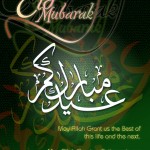This week my Muslim friends in Egypt and throughout the world are celebrating Eid Mubarak. Eid means “Feast” and refers to the occasion itself. Mubarak means “Blessed”. Muslims wish each other Eid Mubarak after performing the Eid prayer. The celebration continues until the end of the day for Eid ul-Fitr (or al-Fitr) and continues for three more days until Eid ul-Adha (or Al-Adha). However, in the social sense people usually celebrate Eid ul-Fitr at the same time as Eid ul-Adha. They visit their families and exchange greetings such as “Eid Mubarak”. This exchange of greetings is a cultural tradition and not part of any religious obligation. 
The first feast includes some special cookies. During this time Egyptian children will also receive money from their parents, aunts, uncles, and cousins. The main feast will consist of different kinds of meat from sheep to beef to goat to buffalo to camel. It depends upon the preference of the family. The animal will be sacrificed on the day of the feast and prepared for the family to eat. The animal can be slaughtered at any time from the first day of the feast until the fourth day. However, after sunset on the fourth day of the holiday, no animal can be slaughtered. The family will also share its great feast with neighbors and those who are in need of food. The meat will be divided into three parts. One-third of the meat will be used by the family. One-third will be given to the poor. The final third will be given to other family members and/or neighbors close to them. Money may be collected as well to give to the poor as this is also a holiday that involves charity to others. 
Some families even visit the graves of their deceased family members to conduct prayer services. The rich may even place flowers or fruit on the graves of their loved ones. Also there is a special bread made for this event. It is a sweet bread made with sugar that resembles a type of dessert bread. Since it is sweet, it is eaten alone without anything placed on it.
Of course, much time is also spent at the local mosque in prayer as it is each and every day. In some smaller villages whole communities get together for the prayer service. On every given day, Muslims pray to Allah five times a day either in their mosques or their homes or in their places of work.
The lives of Muslims revolve around Allah. They constantly show their love and respect to Allah and live their lives in the service of Him. Thus, this special holiday in October 2013 which is following several months after Ramadan which occurred in Mid-July of 2013 and ended at the end of the first week in August is a very important and special time for all Muslims and their families.
Randi D. Ward
October 18, 2013





